- Home
- Joseph Bruchac
Bearwalker Page 4
Bearwalker Read online
Page 4
Even so, under other circumstances, I really would have been out in the forest like a shot as soon as I was given the chance. Stereotypes be danged. But things are different now. I have some real reasons for caution.
I got tripped again as soon as I stepped through the door of Hawk Haven. Being little is an advantage in one way, though. When someone trips you, you don’t have far to fall. I went right into a roll that brought me back up to my feet again. Mom had taught me that, as well as making sure when you roll that you come up facing whoever has just tripped you. Asa, of course. He didn’t press what he might have thought was his advantage. Maybe my rolling up to my feet surprised him. Maybe the way I was holding my hands up like a boxer deterred him. Or maybe he remembered that Mr. Wilbur and the camp director, Mr. Mack, were just outside.
He and his crew did have one other little surprise for me. The twelve bunk beds ranged around three walls of the cabin came supplied with thin foam mattresses. Twenty-four mattresses. More than enough for seventeen boys. Except Asa and his boys grabbed all of the seven extras. That left no mattresses on the remaining bunks. I would have had to spread out my sleeping bag on bedsprings—if they even let me claim a bunk for my own.
I figured none of the boys would risk their necks by speaking up for me. When a wildebeest is being chewed on by a pride of lions, the rest of the herd just looks the other way in relief. My only recourse would be to complain to the adults, which would make me even more contemptible in everyone’s eyes as a squealer. I’d rather sleep on the floor.
I was surprised, though, at what happened next.
“Hey, Baron.”
It was Cody. He hooked a thumb toward the bed directly over. As I stared in disbelief, he pulled off the extra mattress he’d placed on his bed and flipped it back over his shoulder onto that top bunk, his eyes on Asa and the others the whole time. Asa’s jaw dropped so far I thought he’d bruise it on the floor.
Somehow I’d found, if not a friend, at least someone who was not going to treat me like pond scum. Under most other circumstances I would have been feeling optimistic about my chances of continued survival were it not for my new major reason for worry. A reason I could only hope was just my imagination.
I should talk to someone about this, but there’s really no one here I trust enough. The adults, even Mr. Wilbur, would say I was being silly. All I trust is this journal—my secret one. I’ve already finished writing something safe and nonrevealing—about how exciting it was to see those three moose—in my school journal. That’s the one that Mr. Wilbur will see. No mention in it of bullies or fearsome, possibly illusory figures.
I’ve spent too much time covering up my real feelings, any obvious signs of weakness or loss, to start sharing my fears with anyone outside my family.
Dad and Mom both told me that the surest way to get mugged when you are walking down a dark street late at night in a big city is to give off fear vibes. Act like you think you’re going to be a victim, you end up as one.
“Of course,” Dad had added, “the smartest thing to do is to avoid being alone on a dark street late at night in the first place.”
I’m taking Dad’s advice now, trying to avoid trouble. Here in this upper bunk in the corner with my back to the wall I can at least see anything that might be coming at me. I’m not off alone in the woods where something huge and deadly might be lurking behind any big tree or bush or rock.
But I can’t stay here forever. I look at my watch just as I hear the clanging sound of a big cowbell being hit by a stick. It’s the signal for everyone to gather in the main hall. We’re going to rejoin our flights—back to the flock. Time to work together, build teams. Happy little birds, be solitary sparrows no longer.
We’ll meet the rest of the camp staff and then be told what group task we have to accomplish for the two remaining hours before dinner—maybe nest-building. Dinner will be our first meal in the dining hall. We were all given lunch bags from the school cafeteria when we left Pioneer Junior High, which we ate on the bus. A sour apple and two peanut butter sandwiches are lodged in my gut like little gooey fists.
I slide my pen into the rings of my private journal and stick it down into the deep breast pocket of my shirt. Slinging my back pack over my shoulder, I climb slowly down the ladder. Why hurry when every step just brings you that much closer to your doom?
6
Bear Facts
Journal time has come and gone. We’ve all gathered together to listen to Mr. Mack lecture us about what he calls—with a little insincere laugh—“the bear facts.”
His voice is monotonous but I’m listening close, making sure he has his facts right.
“There was a time,” he says, consulting the magazine he holds in his hand, “when Ursus Americanus, the American black bear, was almost gone from this land. Here in the Northeast, two hundred years ago, almost all of the forests where bears lived had been cut and turned into farmland. Not only that, bounties were being paid on such large carnivores as bears, wolves, and mountain lions.”
I have to nod my head at that. It’s true. In the early 1800s they were paying five dollars a head for bear scalps, which was big money back then. There was a war on bears.
It wasn’t just that those animals sometimes killed livestock. People were afraid of them. All kinds of grisly stories were told about humans being killed by wild animals…or saved from them at the very last minute by a hunter who was just in time to shoot the bear or wolf or mountain lion as it was about to pounce on some innocent person. Kind of like that woods-man who rescues Little Red Riding Hood from the evil wolf.
In point of fact, though, it was those big animals that had to be afraid. For every wolf or bear or mountain lion that even looked at a human being, thousands were killed. There’s nothing more dangerous than humans.
“In all of the North American continent,” Mr. Mack continues, turning a page, “over the last hundred years, only fifty-two humans have been killed by black bears—most of them people foolish enough to get in between a mother bear and her cubs or unlucky enough to come upon a bear that had broken into a camp for food. What a bear does then is try to get away. And if you are between that bear and the door, you’ll be moved aside by that frightened but potentially lethal bruin.
“Today the bears have returned. Slim as it may be, there’s always the chance of a dangerous bear encounter when you are in the northeastern forests nowadays. In the Northeast, from Maine through Pennsylvania, it’s been estimated that there are now as many as fifty thousand wild bears.”
It’s a canned lecture. I know all of those facts, even though they’re new to most of the other kids with me. Some of the kids in our group had begun voicing their fears about running into a bear even before they got off the bus here at Camp Chuckamuck. Or maybe fears is not a strong enough word. Try near hysteria.
It seems that even though I was the only one who stayed in my cabin during the journal time an hour ago, none of the other kids ventured into the woods at all. It was starting to get dark, so they all just hung around within sight of each other and the main camp building. And when someone—and wouldn’t you know it had to be Willy Donner—saw something fairly big and black walking around behind the main cabin, he raised the alarm in that stentorian voice of his. People started screaming (boys as well as girls, I might add) and running.
“Bear! Bear!”
“It’s after me!”
“Help, a bear is chasing us.”
Those terrified shouts had brought me outside just as fast as everyone ran for shelter. A real bear? Cool! I was actually hoping to see it.
Instead, I arrived on the scene just in time for the camp cook’s rotund black Labrador retriever to waddle up to me and lick my face.
Apparently my classmates’ reaction to wild bears is par for the course. Especially after newly arriving campers see the warnings posted in every building about what to do if you see a bear. This lecture Mr. Mack is giving was originally supposed to be part of the orientation
talk after dinner.
He lifts up the magazine he’s been getting his facts from. “It says,” he reads, “that for every person killed by a black bear, 45 are killed by dogs, 249 by lightning, and 60,000 by fellow human beings.” He looks up and gives us a big insincere grin. “See. Nothing to worry about. It says that black bears are actually very shy. If you see a bear in the wild, don’t run. Just back away from it quietly, or shout and stomp your feet.” He closes the magazine and looks around at the still-worried faces of most of my classmates.
So do I. I can’t believe it. Am I the only one who’s not a chicken? Even Asa and his crew, who’ve always tried to make everyone think they are so fearless, were quaking in their boots at the sight of a chubby canine. Some of them would probably still have been trying to crawl under the tables if I hadn’t called out, “Hey, guys, it’s just a dog.”
I reach down and pat Poe-boy, the dog curled up at my feet, on his broad head. Poe-boy. He’s the black Labrador that started the mass panic and now seems to have adopted me as a new friend. With the blessing of his owners. Mrs. Osgood, the woman in the flowered dress I’d seen on the porch when we arrived, had quickly figured out what was happening. She came right out to claim her dog when she heard the screams for help.
We had struck up a conversation while I was petting her dog and the counselors were rounding up the rest of our group who had scattered like a flock of hens fleeing from a fox—taking refuge in the main hall, the bunkhouses, the latrines, and in Asa’s case, on top of the bus. I learned two things about Mrs. Osgood right away. One, that she and her husband were Indians themselves. Abenaki. The second was that punctuation meant nothing once she started a sentence.
“Nice to see that you’ve taken a shine to our dog our boy Fred was like that when he was your age and your size though he is all grown up and gone away and I was just thinking of him today when I was airing out to give to the Salvation Army some of his old clothes you might have seen on the line back of our cabin where there’s just the three of us now, me and George and Poe-boy, our dog here, and I named him that because there was this one poem I always liked called ‘The Raven’ which was about a black bird and seeing as how Labradors is often raven black and the man what wrote the poem was named Poe and that Poe-boy is a male dog…”
You get the picture.
The only thing that stopped her flow of words was the arrival of her husband. I liked Mr. Osgood as soon as I saw him. He was as thin as his wife was round. He had that tough, weathered look that some Mohawk elders have—like he was made of sinew and leather. He wasn’t dressed in modern clothing, but wore red and black wool pants held up by suspenders and a work shirt with a similarly patterned wool coat over the top. In those clothes he looked like a lumberjack or an old-time guide. A little like my uncle Jules, in fact. Uncle Jules always favors clothes made of natural materials like wool and cotton. Even when they’re wet, he says, they keep you warm. Not like these new space-age fabrics.
Mr. Osgood’s long gray hair came down to the shoulders of that old wool coat. It framed a narrow face seamed with smile lines. In his left hand he was holding a stick connected by a string to an old cast-iron frying pan he held in his right hand.
“George,” Mrs. Osgood said, “put down the bear pan and come meet these two nice boys Baron and his friend Cody who have made friends with our Poe-boy and…”
“Any bear come into camp,” Mr. Osgood said, “they just hightail it for the hills when we bang on this bear pan. Even faster than your fellow campers done when they thought a bear was after ’em.”
Mr. Osgood looked down at me with a twinkle in his eyes. “Aren’t you afeared of bears, young fella?”
“No sir,” I said. “I’d like to see one.”
“Hmm.” Mr. Osgood nodded, a pleased look on his face. “Some spare time, I ought to take you and your friend here up to the Bear Seat.”
I look over at Cody, who is sitting on the other side of the fire during Mr. Mack’s speech. I have to give him credit. Although at first he ran inside the boys’ cabin, he was also the only one who came back and stood next to the door to try to guard it—with a broom that he picked up, no less—just in case that black beast tried to follow them in. As a result, he saw that the supposed bear was nothing but a dog and came over to join me petting Poe-boy.
Cody senses my eyes on him. He looks my way and actually smiles. He’s still a little embarrassed at having been spooked, but is able to see the humor in the way he and everybody else acted. My mom always told me you can trust folks who know how to laugh at themselves. Cody’s smile encourages me and I relax. Maybe too much.
“Any questions?” Mr. Mack says.
I raise my hand. It’s as if there is another part of me taking over and I’m not really sure what it is about to say. And what is worse, I can’t seem to stop it from happening. It’s like when a stone breaks loose from a hillside and starts to roll. Nothing is going to halt it until it hits the bottom.
“Yes, ah…”
“Baron,” I say. “My family is Mohawk. I grew up hearing stories about black bears. None of our people were ever afraid of real bears. We even have a story about how a mother bear took in an orphan boy and cared for him like she was one of her cubs.”
Why am I saying this? Is it something in the air here? After a year of semisuccessfully allowing my Indian ancestry to fade into the background, I have just blown my cover bigtime. Clam up, dummy! I tell myself.
I manage to snap my mouth shut before I babble out anything else that might be used against me later. It’s probably too late. I can already imagine Asa war-whooping at me and his buddies sarcastically calling me “Little Bear.”
Mr. Mack is smiling even broader, but his eyes don’t look happy. I get the feeling he’s not that pleased that I spoke up.
“Baron, thank you. How wonderful. I’d love to hear that story.” He looks around the circle. “And I am sure that everyone else here feels exactly the same. An authentic Native American traditional tale! Perhaps we can convince you to share it with us around the campfire one of these evenings.”
Or perhaps you could convince me to shoot myself right now, I think.
There’s no way it can get worse than this.
7
Stories About Bears
Wherever you go, Indians have stories about bears. And bears are a lot like people. They walk on two legs at times and when a bear is skinned it looks like a naked human being. Bears eat some of the same food that people do. They even have the same illnesses. The strongest of the old medicines among my own Mohawk people were supposed to have been given to us by the bears. People watched what bears ate when they had certain sicknesses because they found that eating those same medicinal plants would make people get better, too.
My dad and mom once took me to the Six Nations Indian Museum in the little northern Adirondack town of Onchiota. It’s on the other side of the mountains from where we are, over to the northwest near Saranac Lake. It’s one of the old-style Indian museums, not like one of those big new ones funded with casino money. The Six Nations Museum was built by a Mohawk elder named Ray Fadden, constructed by him and his relatives with their own hands. It’s a big old log cabin, in the shape of the longhouse. It’s only open in the summer because it doesn’t have modern heating or air-conditioning. Its only “climate control” is a woodstove. Simple as it is, though, it’s full of information about the history and culture of our Iroquois people. The walls and even the ceiling beams are hung with so many things—posters and wampum belts, gustowehs (the traditional feathered cap our men wear), moccasins, clothing of all kinds—that you feel dizzy trying to take it all in.
Ray Fadden had been a teacher at Akwesasne back when my dad and mom’s parents were young people. In fact, he taught all four of my grandparents. He was their favorite teacher because he passed on so much about our old ways at a time when everyone else was turning away from our traditions. Finally he quit teaching and built the museum to keep on sharing those old
ways with the new generations. Being taken to his museum by my mom and dad was kind of a family tradition, even though Mr. Fadden himself, who was in his nineties by the time I went there, was living in an elder care center up on the reservation.
The best part about the place for me was the stories that Mr. Fadden’s son, Kahionhes, told us. He’d been an art teacher in the Saranac Lake schools but he was now retired and had taken on his father’s job of keeping the museum open in the summers. Some of those stories were very old—but the ones I liked best were the ones about his dad and the animals, especially the bears.
Food had become scarce for the birds and animals because of the acid rain in the Adirondacks, so for years and years, Ray Fadden provided food for the animals in the woods he owned all around the museum. He would buy birdseed and had an arrangement with the markets to pick up their food scraps. Sometimes as many as thirty black bears would come to the big rock back in the woods where he placed food for them.
He never fed them by hand or followed them around or tried to make them into pets. He respected them too much for that. But he sort of learned how to talk their language. There are all kinds of vocalizations that bears use. Like, there is a growl a bear makes to warn you to keep away. And when a bear is greeting you in a friendly way it kind of sways its head back and forth and makes a kind of unnh-unnh, unnnhh-unnhhh sound. A little smile came over Kahionhes’s face as he told us how whenever his father met a bear in the woods he would do that—bend over and sway back and forth and go “Unnhh-unnh, unnnhh-unnhhh”—and the bear would do it back to him. Then they would each go their own way. Bears also hoot to each other—just like owls.
There are some sounds that can mean you’re in danger. The first is a deep cough that is a threat. “Get away from me or else” is what it means. And then there is actually a sort of whistling, chirping sound that a mother bear uses when she is calling her cubs. You need to walk away from that sound, too. The worst place anyone can be is between a mother bear and her cubs.

 Peacemaker
Peacemaker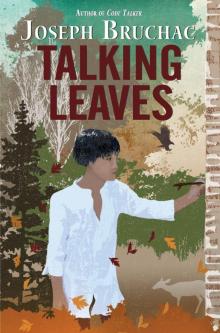 Talking Leaves
Talking Leaves Found
Found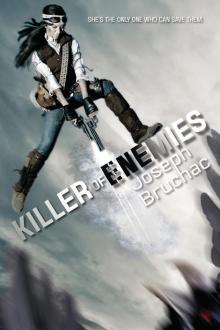 Killer of Enemies
Killer of Enemies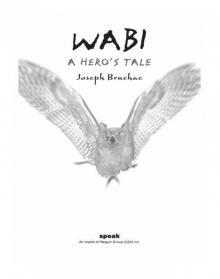 Wabi
Wabi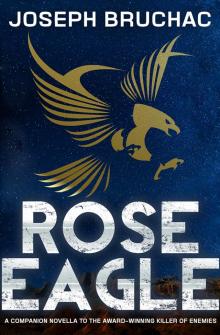 Rose Eagle
Rose Eagle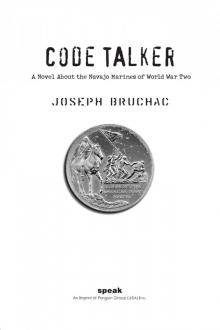 Code Talker
Code Talker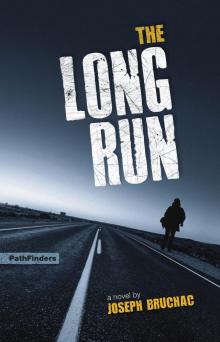 The Long Run
The Long Run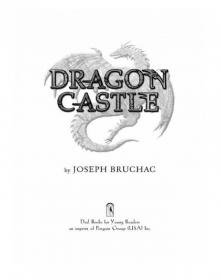 Dragon Castle
Dragon Castle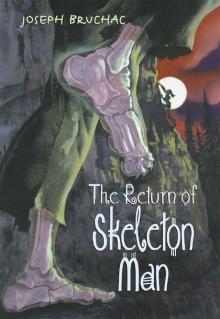 The Return of Skeleton Man
The Return of Skeleton Man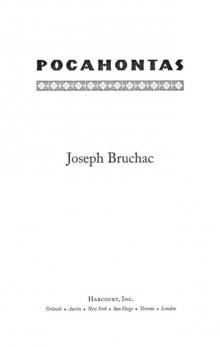 Pocahontas
Pocahontas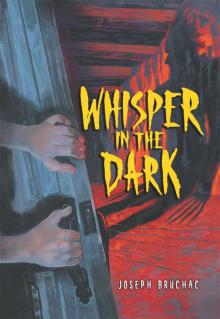 Whisper in the Dark
Whisper in the Dark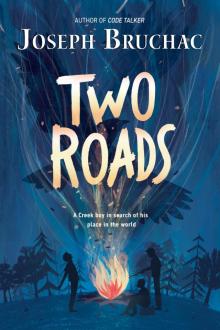 Two Roads
Two Roads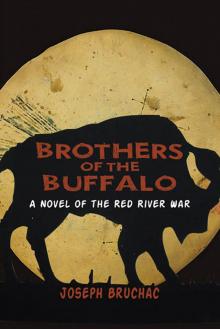 Brothers of the Buffalo
Brothers of the Buffalo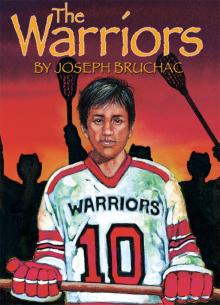 The Warriors
The Warriors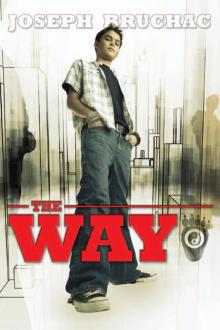 The Way
The Way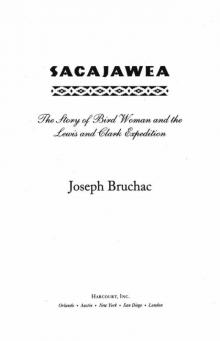 Sacajawea
Sacajawea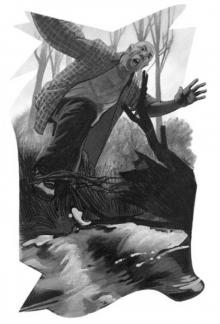 Night Wings
Night Wings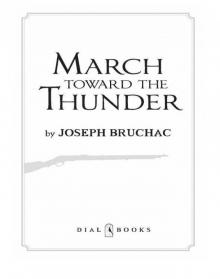 March Toward the Thunder
March Toward the Thunder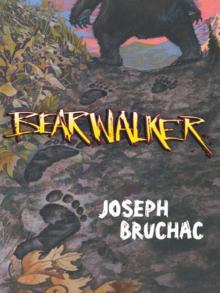 Bearwalker
Bearwalker Skeleton Man
Skeleton Man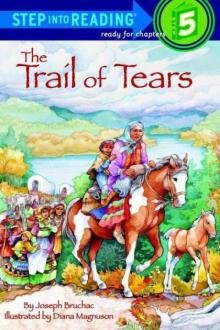 The Trail of Tears
The Trail of Tears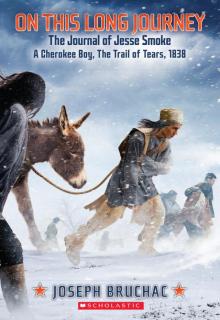 On This Long Journey
On This Long Journey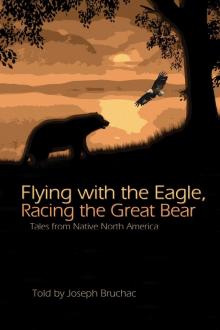 Flying with the Eagle, Racing the Great Bear
Flying with the Eagle, Racing the Great Bear